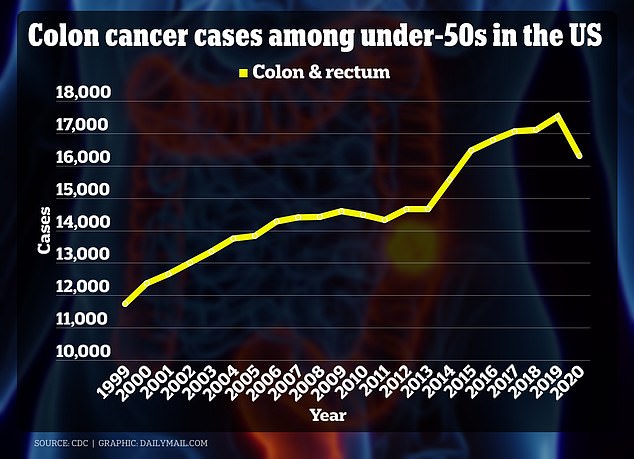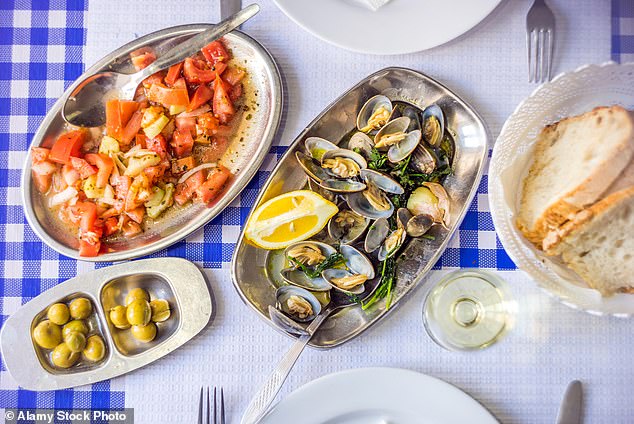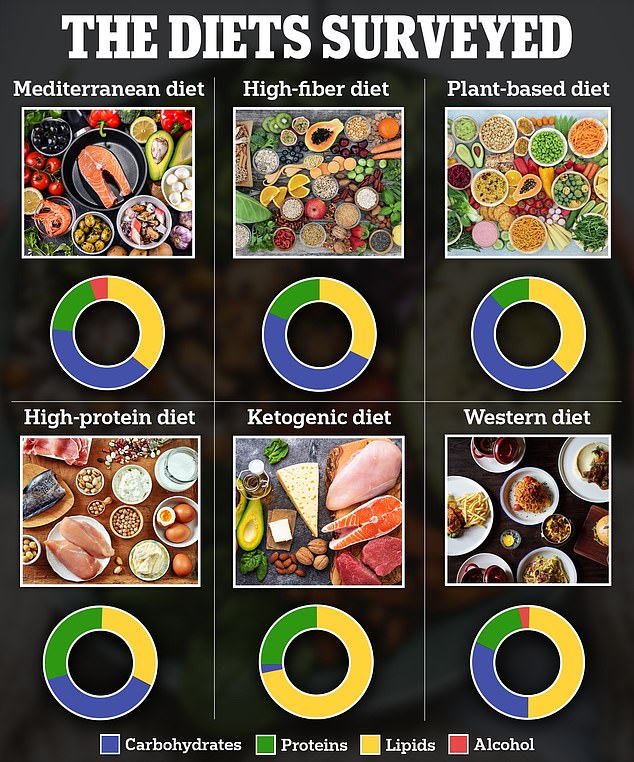Scientists investigating the explosion of colon cancers in young people say they have made “profound” discoveries about the role played by differences in diet.
Researchers compared and contrasted 176 previous scientific studies in an effort to delve into the details of how six popular diets impact gut microbiomes in humans and which diets lead to an increase in gut bacteria linked to tumor growth.
Based on these nearly two hundred studies, their comprehensive review found that a Western diet high in sugar, saturated fat and processed foods had the greatest risks.
But the team found that a high-fiber diet used to control diabetics’ blood sugar had a protective effect against cancer-related changes.
The study also raised a high level of skepticism toward the health benefits of high-protein and ketogenic diets, often popular among health-conscious athletes.
A microbiologist who worked on the new review study called it “a significant milestone” that provides “tangible data” on how the microbiome is relevant to health.
The Western diet appeared to reduce the diversity of bacteria in the gut, leading to an explosion in Bacteroides Species linked to obesity.
These foods also left behind a soupcon of additives and preservatives that researchers found were linked to “increased chronic inflammation” in the gut.
The team found that a Western diet — low in fiber, fruits and vegetables — also made it difficult for the digestive system to break down any healthy fiber after consuming it.
The researchers said people following a Western diet also had fewer species of bacteria that produce short-chain fatty acids, which may help reduce inflammation in the gut.
Chronic, or long-term, inflammation in the gut is worrisome because it can lead to harmful mutations in cells, increasing the chance that they will become cancerous.
Ultra-processed foods, such as donuts, pizza and chips, have previously been linked to an increased risk of inflammation and associated health risks.

The graph above shows the rise in colorectal cancer in young Americans from 1999 to 2020.
On the other hand, those who followed a green Mediterranean diet (rich in fruits, vegetables and olive oil, as well as green tea and protein-rich aquatic plants, such as Mankai (duckweed)) had the best overall health outcomes.
Researchers said it triggered an increase in “health-promoting bacteria” in the gut and reduced the abundance of those linked to cell damage.
Many of the 176 studies reviewed for the new analysis, published this week in the journal Nature Reviews on Microbiologyturned to a bacterial genetic identification technique called “metagenomic sequencing” to study the intestinal microbiome.
Ecologists have also used this method to study the hidden microbial world in nature and to assess the environmental health of contaminated post-industrial sites.
Fair One of those studies aloneFor example, they tracked changes in the gut bacteria of 307 male participants along with their dietary behaviors over half a year.
In total, the scientific reviewers divided this mountain of research into studies of six different broad categories of diet: the Western diet and the Mediterranean diet, but also high-fiber and high-protein diets, plant-based diets and ketogenic diets.
A diet high in fiber, or one that includes plenty of whole grains, is popular among those who suffer from chronic constipation or are looking to lose weight.
And the review suggested it had a protective effect against colon cancer, type 2 diabetes and inflammation specifically because it changed the mix of bacteria within the gut microbiome.
High-fiber plant matter consumed was found to lead to a “substantial increase” in populations of Lactobacillus and Bifidobacteria bacteria, which release beneficial compounds, such as short-chain fatty acids, that can reduce inflammation.

Researchers in Ireland compared and contrasted 176 previous scientific studies in an effort to delve into the details of how six popular diets impact gut microbiomes in humans and which diets lead to an increase in gut bacteria linked to tumor growth (file image, above).
A plant-based, or vegetarian, diet was also found to reduce the risk of colon cancer because plant polyphenols stimulated the growth of other beneficial bacteria.
The plant-based diet in particular showed an increase in a particular group of bacteria, of the genus Akermansiathat help fight bacterial diseases, the researcher wrote.
The researchers called for more research on the ketogenic diet (or high-fat diet) and warned of a history of previous studies showing that it can cause sudden drops in the populations of 19 different species of beneficial bacteria, called Bifidobacteria.
As Akermansiathese Bifidobacteria They also play a crucial role in “regulating the immune system,” the researchers said, by curbing the growth of infectious bacteria.
But the team also expressed concern about high-protein diets that include a lot of red meat.
In their review, they noted that the decomposition of meat in the gut can lead to the release of hydrogen sulfide, which can cause harmful mutations in nearby cells.
“Our review highlights the profound impact of different diets on the gut microbiome,” said the review’s lead author, Dr. Catherine Stanton, in a statement.
“This understanding is crucial to developing dietary recommendations that promote health and prevent disease,” said Dr Stanton, who works for Teagasc, an Irish public-private organisation that studies food and agriculture.
“It’s fascinating to see how dietary choices can influence the balance of microorganisms in our gut,” he added, “and their metabolic functions.”

Liberty “Libbie” Ashworth was diagnosed with stage 4 colon cancer when she was just 14 years old, after a visit to the hospital for severe abdominal pain. She is from Panora, Iowa.

In the photo above, Evan White is pictured with his fiancée Katie Briggs and their dog Lola. The couple had started dating when Evan had cancer and got engaged when his condition stabilized. However, he passed away after four years of battling the disease.
The review comes amid a race among researchers to understand the explosion of colon cancer cases among people under 50.
Today, around 17,000 people under the age of 50 develop the disease each year, an increase of almost 50 percent in just two decades (compared to 12,000 cases per year in 1999).
The rate of colon cancer among people between the ages of 20 and 30 is estimated to have increased by 70 percent over the same period.
Other types of cancer are also increasing among young people, including bile duct cancer (in the intestines), breast cancer and appendix cancer.
Kate Middleton, 42, was among the younger celebrities to bravely reveal they had cancer this year, while actress Olivia Munn, 43, revealed last year that she was suffering from breast cancer.
Scientists are unsure what is causing the rise in cancers among young people and have so far blamed everything from rising obesity rates to the regular consumption of processed foods.
Meanwhile, a separate study has suggested that an additive used in Red Bull and other energy drinks could boost the growth of cancer cells.
A government-funded team of researchers launched a $25 million investigation into the cause of the surge in March this year.
Colon cancer is especially worrisome because it often doesn’t cause symptoms until later stages, when it is more advanced and harder to treat.
Current guidelines say all Americans over age 45 should be screened for cancer, but some doctors are calling for this age limit to be lowered even further.


